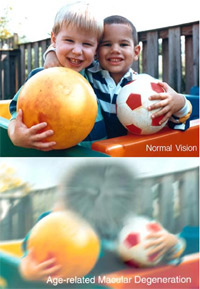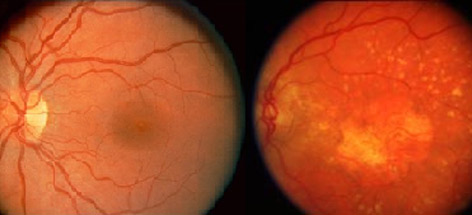- Computerized Visual Acuity Measurement
- Refractive Surgery with Excimer Laser
- Cataract Surgery
- Strabismus Surgery
- Glaucoma
- Corneal Transplant
- Laser Treatment for diabetics
- Surgical correction of High Myopia
- Intracanalicular implants
- Autologous serum and severe dry eye
- Macular Degeneration related to age
 (511) 225-1627 (511) 224-2135
(511) 225-1627 (511) 224-2135Specialties
We Accept:







 Alteration of central vision in macular degeneration.
Alteration of central vision in macular degeneration.
Macular Degeneration related to age
There is a strong relation between smoking and the presence of this disease.

(Top photo: fundus of the eye. Left, normal macula. Right, macular degeneration related to age). Macular degeneration related to age or senile macular degeneration is a pathology that occurs in patients over 55 years of age. It is one of the leading causes of legal blindness. It is characterized by progressive damage to the macula, a small area in the center of the retina. This disease is more common in white persons.
Patients suffering from this disease experience blurred vision or with shadows that, over time, create a blind spot in the central vision. Another feature is the distortion of images, which makes straight lines appear crooked. It may also affect color perception.
There are two types of macular degeneration: the dry or atrophic form, which is the most common, accounting for more than 90% of cases; and the wet or neovascular form, of lower incidence, but greater severity.
Treatment
In all cases it is recommended to quit smoking, due to the high relationship found between smoking and the presence of this disease.





